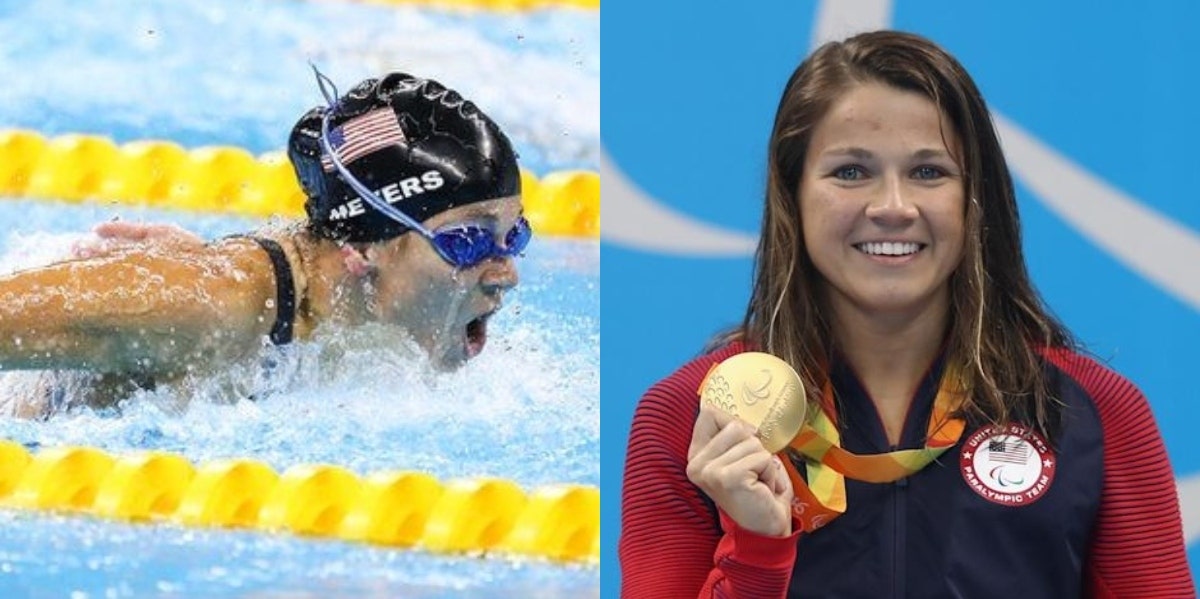Deaf-Blind Paralympian Becca Meyers Drops Out Of Tokyo Games After Being Denied A Personal Care Assistant
I'm sad not to be representing my country," Meyers said.
 Getty Images
Getty Images Swimmer Becca Meyers, 26, a three-time Paralympic gold medalist, has pulled out of the 2020 Tokyo games after being told she couldn’t bring her Personal Care Assistant (PCA) to the competition.
In a statement she shared in part on social media and detailed more fully in USA Today, the Baltimore native said she was “heartbroken” to share the “gut-wrenching decision to withdraw," pointing to the ongoing and relentless fight for disability rights across the globe.
Why did swimmer Becca Meyers withdraw from the Tokyo 2020 Paralympics?
In a snippet of her personal essay, which shes shared on her Twitter, Instagram and Facebook accounts, Meyers, who is deaf and legally blind, explained she felt she had “no choice” but to pull out of the games after the U.S. Olympic & Paralympic Committee denied her request to have her mother, who acts as her Personal Care Assistant, travel with her to Tokyo for the 2020 Paralympics.
The decision by the USOPC is part of new safety measures in place due to COVID-19. The measures state “non-essential staff” are not allowed at the games, but Meyers argues that, due to her disability, bringing her own Personal Care Assistant is necessary.
Meyers says she requires a “trusted PCA” and has been accompanied by her mother, Maria Meyers, to all other international swim meets she's competed in since 2017.
Meyers is advocating for disability rights.
Instead of individual PCAs, this year 33 Paralympic swimmers will have to share one PCA. Meyers says nine of the people competing are visually impaired.
Though the decision left her “angry” and “disappointed,” Meyers said she came to it not only for personal reasons, but as a form of advocacy for other people with disabilities.
"So, in 2021, why as a disabled person am I still fighting for my rights?" she wrote. "I'm speaking up for future generations of Paralympic athletes in hope that they never have to experience the pain I've been through. Enough is enough."
The refusal to allow for trusted PCAs illustrates the lack of agency and self-determination allowed to adults living with disabilities.
Though this denial of autonomy is a widespread issue for people with disabilities, it seems particularly cruel in a sporting event designed to give Paralympians equal opportunities and a safe, comfortable space to compete in sports.
Life coach Keya Murthy says the issue Meyers’ is facing is part of a historical disregard for people with disabilities that keeps them living in inequality.
“Becca Meyers losing her chance to compete at the Olympics is a continuation of the bias and injustice doled out to marginalized communities throughout history,” Murthy says.
“A person with a disability is not treated equally in society. We either feel bad for them or ignore them. More awareness, inclusion, acceptance at the societal level is needed besides legal rights.”
Leaving Meyers with no choice but to navigate the Paralympic Games without the support she both needs and is accustomed to or withdraw entirely speaks to a wider culture of expecting people with disabilities to simply make do without the most basic assistance.
Alice Kelly is a writer living in Brooklyn, New York. Catch her covering all things social justice, news, and entertainment. Keep up with her Twitter for more.

